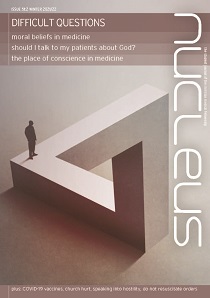disappointment and growing mistrust
In an age where stories of use and abuse in the church seem to be travelling faster than stories of reconciliation, I am thirsting for clarity and openness from the church. It is hard to escape a real sense of hopelessness, as one after another independent investigations are launched into various church leaders. There goes another leader whose word I have trusted, and who turned out to be a liar. [1] And another one who I thought had integrity, who really does not. Money laundering and sex abuse scandals on a corporate scale only seem to compound the fear that even the people I respect the most at a local level might not, in fact, be trustworthy. Inch by inch, I find myself pushed to a place where I think I'm better off — or at least safer — without people. It is an all too familiar disappointment and another painful reminder of just how far we are from God's perfect design. So how should we respond? Fight? Or flight?is it unreasonable?
Perhaps my expectations are misplaced? Maybe I shouldn't be so personally invested in my church leaders? And yet the reality is that we DO have a different expectation of our leaders in the church. We expect them to be of godly character. [2] I am not in search of heroes for leaders; but I am in search of consistent and faithful servants of Jesus to signpost the way; people who live consistently, in public and in private. I know that becoming detached or indifferent to the lives of our leaders is not a solution to dealing with hurt, and it will only isolate me further. Therefore, I need to think more carefully about how to reconcile relationships with church leaders, when trust is broken on either a corporate or local level.grappling with the facts
As we humbly reflect on the reports of the past year, one of the common themes is that there are less opportunities for individuals to disclose abuse by influential people with a far-reaching network of trusting supporters. Disclosures that do happen are often tentative, shrouded by fear and self-doubt, and therefore take time to come to light. Additionally, the reverence and respect that we attribute to leaders in church adds a layer of complexity; the gospel in some instances can be misused as a defence against accusations of abuse.
It is no secret that church leaders at both local and corporate level are phenomenally influential; they command the time and attention of a congregation on a regular basis and the Bible encourages congregations to be receptive to the guidance of their wise and trusted leaders. We pray to be people who are discerning and watchful of false teachers. 3 But the downfall of our leaders almost always happens on a more personal level.
As we approach this topic, therefore, and reflect on our own experiences of church leadership, my prayer is for real clarity of mind; that we would listen carefully to the experiences of our brothers and sisters and be able to lament and protest with God in areas that we feel let down by him. May this be a time of self-reflection, and guidance from God as we look to deconstruct the pedestals on which we have placed people in our hearts and minds and work towards actionable change.
actionable change: corporate level
The painful process of exposing abuse in the global church is, counter-intuitively, a relief to see. If ever there were a sign of a church striving for health, it is by bringing these issues into the light in order to address them. When I look at numerous examples of church 'superstars' who fall into sin, it makes me think of sin as an ever-present, relentless enemy that pursues us. It does not stop because of any previous faithfulness of ours, nor are we protected from it in future, because of our faith from yesterday. We will not graduate from dealing with sin in this lifetime. This is true of all believers following Jesus. And whilst I do not believe that it is fair to diminish the actions of high-profile abuse scandals with 'we're all sinners', it is a reminder for me to never cease praying for church leaders globally, as I pray for myself, in the flight from sin.Yet when I look back through history at the work of infamous church leaders, what continues to surprise me is the undeniable value in their work. It is frustrating and humbling to know God would be willing to bring about good from very dark and cruel people. That even from the most toxic of streams, spring forth blessings for the masses. It is further evidence of his ability to create beauty out of the ugliest parts of humanity. And if I'm being honest, it gives me hope when I search the darkest parts of my own heart, that he is loving and gracious enough to use me.
But this does raise the question - why does God use those people? Why does he allow people to be victimised in his church? There are clearly no straightforward answers. Though let's be clear about this: to the victims of hurt, rape, abuse or manipulation, nothing has gone unseen. We follow a saviour who is truly grieved and himself has bled and wept for the deep pains we go through. He takes the matter so seriously that he took it to the grave to deal with it. And as a global church we stand in solidarity with the oppressed and shoulder the weight of what they have wrongly experienced. When we think about extending God's unmerited grace towards others, we do not ignore what they have done in the same way that a prisoner will not be released from prison just because they are seeking genuine forgiveness for their crimes. There are real consequences for our sins, which have a lasting effect on people. Showing grace to others does not equate to ignoring or forgetting what has happened, or a nullification of its effects.
I notice real conflict within myself when deciding whether to listen to the teaching of ministers, deceased or alive, who have left behind them a trail of destroyed lives. I don't think there is a right answer to this. When I consider the scale, depth and longevity of their deception, it's difficult to separate the teacher from the teachings. Not only that, but we should not be required to continue bringing attention to them or to reference their work. If we do listen to or read their work, it's wise to be on guard; has their theology been bent to accommodate their sin? Am I sure that their teaching is consistent with what God teaches me about himself, through his word?
actionable change: local level
The hurt caused in a church may in some instances be so compromising that it drives us out of the church altogether. When I feel tempted to withdraw myself from a local body, I'm reminded of a significant moment detailed in Acts 9 — the conversion of the apostle Paul. In this moment, God reminds us that his church is inextricably linked to him. And to persecute members of his church is to persecute him. I do not believe in leaders of the church. I believe in the church because it's God's church; I don't place all my trust in its appointed leaders. And God will not allow me to be a part of a global or local body that is not somehow for my good. When my mistrust in people grows, I need to ask myself — is this perhaps rooted in a lack of trust in him? Do I believe that he knows what's best for me? Do I trust him to hold me fast, even when others inevitably let me down? He often uses people as conduits of healing and restoration. So, to isolate ourselves from people, inhibits us from accessing the comfort and healing that we pray so earnestly for.For every mega-church leader who is safely removed from the accountability of a church family, I'm encouraged by hundreds of local leaders, who live faithfully among the flock. In local bodies, we can get beyond what our leaders say and get close to who they really are, in meaningful accountability. As a key part of this, we need diverse communities to confess to, and to be the voice of Jesus to one another. It is community that gently exposes our ignorance and stops us from lying to ourselves or downplaying early seeds of sin. I'd also encourage people to be part of local churches that are committed to putting systemic structures in place to safeguard vulnerable groups; child protection policies, for example, are really important. Such things are needed because of the depth and reality of sin, which presses on even the most well-intentioned leaders.
Lastly, it is my prayer that we would be the types of followers who listen carefully to the cues of our brothers and sisters who may have had a negative experience with a leader. It takes courage and resilience to address this, whether it be to denominational authorities, or even the police where necessary. If the matters in this article concern you, you can also contact the CMF Pastoral Care and Wellbeing team at [email protected] But above all, may we look to the Lord as our guide: the perfect demonstration of what it means to be a leader and the one who cares for us like none other.
And he is the head of the body, the church; he is the beginning and the firstborn from among the dead, so that in everything he might have the supremacy. For God was pleased to have all his fullness dwell in him, and through him to reconcile to himself all things, whether things on earth or things in heaven, by making peace through his blood, shed on the cross. (Colossians 1:18-20)
Thulasi Daniel is a Foundation Year 1 doctor working in the East Midlands
































